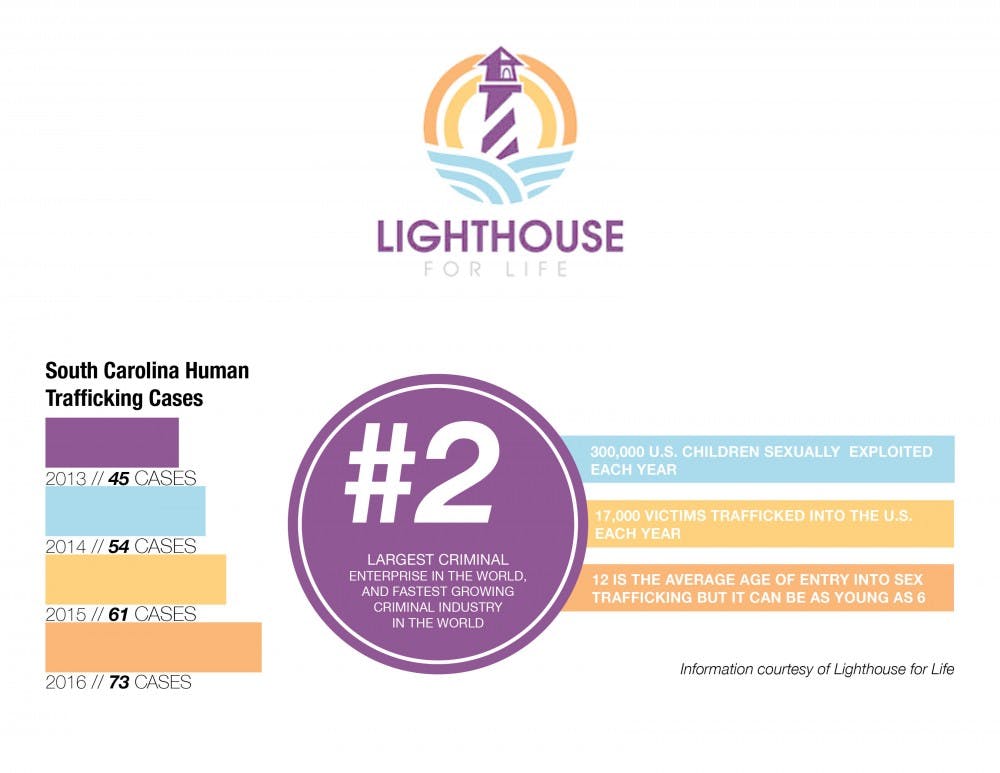Human trafficking is the fastest growing criminal activity worldwide, and the second greatest source of criminal income behind only drug trafficking.
The United States ranks in the top three target markets for the trafficking of women and children for commercial sex. The average lifespan for a person after entering sex trafficking is seven years, and the average age of entry is just 12 years old.
However, there are fewer than 100 trafficking-specific shelters in the country that principally function to help rehabilitate victims, and since Hopewood Haven, a facility in Greenwood which had previously helped adult victims, was forced to suspend its operations due to a lack of funding, there are none currently in the state of South Carolina. Lighthouse for Life, a non-profit organization dedicated to combating human trafficking in the state, is looking to change that.
Lighthouse for Life, based in Richland County, is currently in the process of renovating the Karis Home, a highly individualized recovery facility that, barring any licensure setbacks, will open its doors on July 1. The Karis Home is designed to house up to three victims and is specifically being drafted to accommodate survivors under the age of 18.
The non-profit earned its charter in 2014 and was conceived by founder Andrea Wind. According to the organizations website: "The name, Lighthouse for Life, was birthed from a vision that God gave Andrea of a lighthouse that was surrounded by smaller homes. People from all over were coming towards the Light and finding shelter in those homes."
Through its fundraising efforts, Lighthouse for Life raised enough money to pay off its mortgage for the safe home, but also estimates that it helped spread awareness with 6,000 people in 2016.
"A lot of people have the idea of the movie 'Taken" in their head, or they think about people over the age of 18 as a willing participant in commercial sex," said Jen Thompson, executive director of Lighthouse for Life. "That they just decided not to get a real job and to do that instead — and that's not the case."
Lighthouse for Life not only seeks to spread awareness about human trafficking, but also seeks to dispel misconceptions about its victims.
"If 70 percent [of victims] do come from the disenfranchised background, the other thirty don't," she said. "They come from two-parent homes — all-American teenagers involved in student government, athletics, honor roll — all of that," Thompson said.
It's not just the victims that people might have the wrong idea about. Thompson said that pimps don't always look like the stereotypical image people have in their heads.
"Teenagers have recruited other teenagers. I mean 15-, 16-year-old girls can recruit other 15-, 16-year-old girls," she said. "So the face of who could be a victim could be anybody. The face of who could be a purchaser could be anybody, and the face of who could be a trafficker basically could be anybody."
South Carolina citizens are being trafficked by a demand driven by other South Carolina citizens, Thompson said.
Columbia is one of only a handful of cities in the Southeast to be serviced by three major interstate highways, with I-20, I-26 and I-77 all converging in the Midlands, plus I-85 and I-95 also running through other parts of the state.
"Really we have five major highways going through our state. Plus we have Myrtle Beach, which is a crazy high tourist destination for a lot of people in the Northeast," Thompson said. "But we are also not big like Charlotte or Atlanta, so trafficking is kind of off the radar because of how rural some of our countryside might be, but we still have enough people to have quite the market."
"Richland County averages a case a week — easy," Thompson said. "Greenville is seeing a lot of this [sex trafficking cases]. It's in all the counties, but there are some counties that are just more actively engaged in pursuing it than others."
The Polaris Project, which tracks cases reported on the National Human Trafficking Hotline, recorded 73 cases in South Carolina in 2016. The number of reported cases has been continuously on the rise, and is up 152 percent since 2012.
Nationally, there was a 24 percent increase in survivors seeking help in 2016.
Feb. 23 is National Shine A Light On Slavery Day and Lighthouse for Life is hosting its second annual Run For Her 5k in Saluda Shoals Park on Feb. 25.
National Human Trafficking Hotline: 1 (888) 373-7888

